Information Regulator bares its teeth in music royalties investigation
The South African music industry lacks transparency and accountability, says regulator
Artists protesting in May 2021 outside the Department of Arts and Culture in Pretoria in May. Archive photo: Julia Evans
- The Information Regulator has found in favour of a music rights holder who needed access to records of the royalties it is owed.
- Under the Promotion of Access to Information Act (PAIA), anyone is entitled to information if it is necessary for the protection of their rights.
- With the power to make legally binding orders, the Information Regulator is able to enforce PAIA.
In its biggest investigation yet, the Information Regulator has found in favour of a complainant whose application under the Promotion of Access to Information Act (PAIA) of 2000 was refused. The findings show that in its relatively new role, the Information Regulator is already promoting transparency and access to information.
Under PAIA, anyone can request access to information from a private or public entity when that information is needed to exercise or protect their rights. But when PAIA applications were refused or ignored, there was little recourse for the applicant.
The mandate to deal with complaints around PAIA used to lie with the Human Rights Commission, which did not have order powers.
The Information Regulator took over the mandate in June 2021, following an amendment of the act and proclamation by the President to advance the aims of PAIA.
The Regulator is an independent body, established under the Protection of Personal Information Act (POPIA).
In an investigation report issued on 25 November, the Information Regulator found that RISA Audio Visual (RAV) was wrong to refuse Hardwick Trading’s PAIA application to access financial information.
Hardwick Trading was owed royalties by RISA Audio Visual (RAV) for the broadcast of music. It had only received a portion of the royalties it was owed and lodged a PAIA application to RAV in April 2021, requesting access to broadcasting and payment records.
The application was refused by RAV on the grounds that Hardwick Trading did not provide evidence that they were owed royalties. Hardwick Trading then complained to the Information Regulator in November 2021.
The investigation that followed is one of the Information Regulator’s first and biggest, involving public hearings and leading to an extensive report, says Alison Tilley, a part-time member of the Information Regulator and the coordinator of Judges Matter.
The Information Regulator is fully resourced to carry out these types of investigations, Tilley told GroundUp.
The matter at hand involved a complicated assessment of rights ownership, which was disputed by RAV. A year after the complaint was laid, the Information Regulator found in favour of Hardwick Trading.
The report found that the records requested by Hardwick Trading were necessary for the protection of its rights and that RAV’s reason for refusing access was not substantiated.
The report recommends setting aside the decision of RAV to refuse access to the records and that RAV disclose the records within fourteen days.
The report cites a GroundUp article about the non-payment of royalties in the music industry. According to the report, the article “highlighted…the lack of transparency and accountability in the South African music industry.”
The article also pointed to the “public interest in the matter” and how the issue affects the rights of “different role players in the music industry”, the report says.
The Information Regulator will also be releasing a separate report on the lack of transparency in the music industry.
Support independent journalism
Donate using Payfast

Don't miss out on the latest news
We respect your privacy, and promise we won't spam you.
Next: This taxi rank cost more than R275-million. But nearly a decade later it’s still closed
Previous: Sex workers welcome government’s decriminalisation plans
© 2022 GroundUp. This article is licensed under a Creative Commons Attribution-NoDerivatives 4.0 International License.
You may republish this article, so long as you credit the authors and GroundUp, and do not change the text. Please include a link back to the original article.
We put an invisible pixel in the article so that we can count traffic to republishers. All analytics tools are solely on our servers. We do not give our logs to any third party. Logs are deleted after two weeks. We do not use any IP address identifying information except to count regional traffic. We are solely interested in counting hits, not tracking users. If you republish, please do not delete the invisible pixel.

